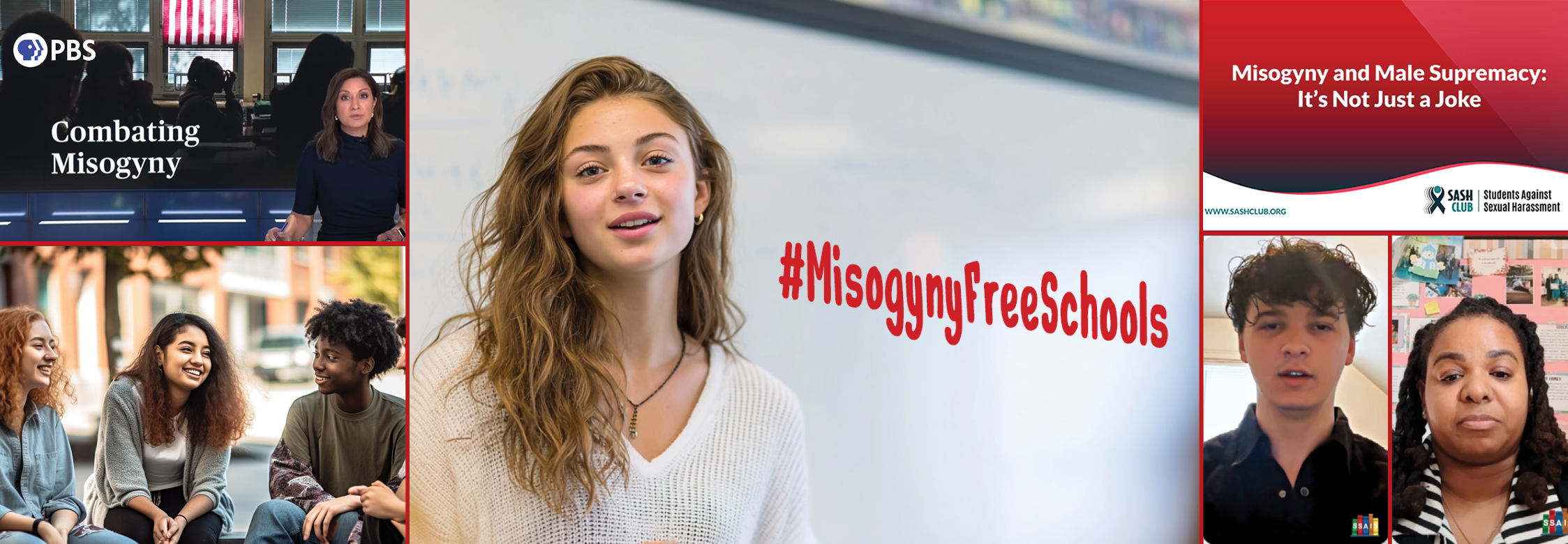#MisogynyFreeSchools: A New Movement for Respect and Safety
Introducing #MisogynyFreeSchools: Learn about a new campaign to combat rising gender bias and create safer schools for all students.

Share
August 6, 2025
Introducing #MisogynyFreeSchools: Learn about a new campaign to combat rising gender bias and create safer schools for all students.
Share
By Joel Levin
Preschool children yelling “bitch.” Elementary school boys chanting “your body, my choice.” Schools rationalizing rape “jokes” as “boys will be boys.” LGBTQIA+ youth shamed as being “unnatural.” Teachers intimidated about their bodies. Deepfake nudes of students and teachers circulated widely.
Teachers are witnessing an alarming rise in misogynistic actions and hostile sexism—behaviors that threaten their students’ well-being and success in school. From rape jokes dismissed as humor to the normalization of gender-based harassment, these attitudes are desensitizing the next generation to gender bias and harassment.
Social media algorithms are feeding young boys content from influencers such as Andrew Tate, who promote harmful ideologies to impressionable audiences.
Enter #MisogynyFreeSchools—a groundbreaking campaign launched by the national nonprofit Stop Sexual Assault in Schools. It aims to disrupt this cycle by equipping schools, educators, students and families with the tools and strategies needed to challenge and change the status quo.
From the earliest grades, children are exposed to sexist language and attitudes—sometimes mimicking what they hear at home or online, sometimes internalizing damaging stereotypes that shape their sense of self and others. Although some downplay the extent of this behavior, educators’ experiences tell a different story. Among participants surveyed in the 2025 AFT Share My Lesson Virtual Conference session “Addressing the Rise and Impact of Misogyny Among Students in Grades 6-12,” 96 percent reported either seeing or hearing examples of misogyny in their classrooms or schools.
Social media algorithms are feeding young boys content from influencers such as Andrew Tate, who promote harmful ideologies to impressionable audiences. Online communities in the "manosphere"—a collection of websites, blogs and forums promoting deeply misogynistic and anti-feminist views—create echo chambers that amplify and reinforce these attitudes. And early exposure to pornography contributes to warped views of gender roles and consent, while backlash against gender equality is fueling resentment among some boys, who believe that efforts to empower girls somehow come at their expense.
The consequences are far-reaching: Girls disengage from class participation, boys adopt emotional repression and aggression, LGBTQIA+ students are targeted, and teachers struggle to create respectful classrooms. This isn’t just about behavior—it’s about the emotional and psychological safety that’s essential for learning.
Girls may limit their classroom participation, avoid enrolling in certain courses, or feel discouraged to pursue their career choices. The stress of navigating hostile environments can lead to self-censorship, reduced ambitions and internalized beliefs that ultimately harm their future relationships and opportunities.
Boys are pressured to conform to rigid and limiting male roles that restrict emotional growth and foster aggression. They hear that dominance toward women proves masculinity, while seeking help or showing feelings demonstrates weakness. Dr. Pasha Dashtgard, a social psychologist and expert on online radicalization, points out that impressionable boys often find a sense of belonging and identity in these online spaces—until they are pulled deeper into harmful ideologies that reinforce grievance, resentment and control.
Because misogyny polices strict gender roles, trans and nonbinary students face hostility simply for existing. LGBTQIA+ students experience intensified harassment, erasure and insecurity for not conforming to gender norms that intersect with homophobia and transphobia. The damage extends beyond individual students to create school cultures that limit learning and growth.
A comprehensive approach is needed—from individual classroom interventions to schoolwide policy changes to community engagement. #MisogynyFreeSchools offers practical guidance and materials for teachers, students and families to recognize, call out, and change harmful behaviors and attitudes.
1. Recognizing and responding to misogyny and gender bias in the classroom
Vanderbilt University prevention specialist Dr. Otis McGresham recommends applying the “Three Rs” framework—recognize, respond and reframe—to help teachers and staff:
Reframe conversations to offer alternative narratives rooted in empathy, equity and critical thinking.
2. Supporting peer education through SASH Clubs (Students Against Sexual Harassment)
SASH Clubs are student-led groups that offer a safe space to discuss misogyny, sexual harassment, online influences and other topics. Through club activities, students learn to lead change in their schools, becoming allies, advocates and critical thinkers.
3. Addressing root causes through media literacy
By incorporating media literacy, sex education, and social and emotional learning into their classrooms, educators can help students:
4. Sustaining a whole school approach
Administrators and staff can create needed support systems by reviewing and strengthening school policies, aligning disciplinary practices with educational values, and supporting staff facing harassment. A thoughtful whole-school approach fosters a climate of respect, safety and inclusion—not just compliance.
5. Building legal and community-based support
The campaign aligns with existing protections under Title IX and state laws, reinforcing students’ legal right to an education free from sex-based discrimination. It also encourages schools to build community partnerships—with PTAs, school boards and local advocacy groups—to bolster support and expand impact, especially in politically uncertain times when legal protections may vary.
#MisogynyFreeSchools is not about silencing students. It’s about elevating them—to be thoughtful, empathetic and unconfined by rigid gender roles.
Want to join the movement? Here’s how:
Students should feel safe to participate fully in their education. It's an achievable goal, one that requires sustained commitment from educators, students, families and communities working together. #MisogynyFreeSchools offers a road map, tools and support to make this vision a reality. Students deserve learning environments that prepare them not just academically, but also socially and emotionally for lives characterized by respect, equality, and compassion.
Want to see more stories like this one? Subscribe to the SML e-newsletter!

Dr. Joel Levin (Ph.D in Education, University of Washington) is an education and learning consultant with over 25 years’ experience analyzing, designing, and developing curricula and educational programs with positive, lasting impact. As Director of Programs for SSAIS, Dr. Levin designs resources for national distribution to address sexual assault in schools for students, parents, and K-12 school staff.
